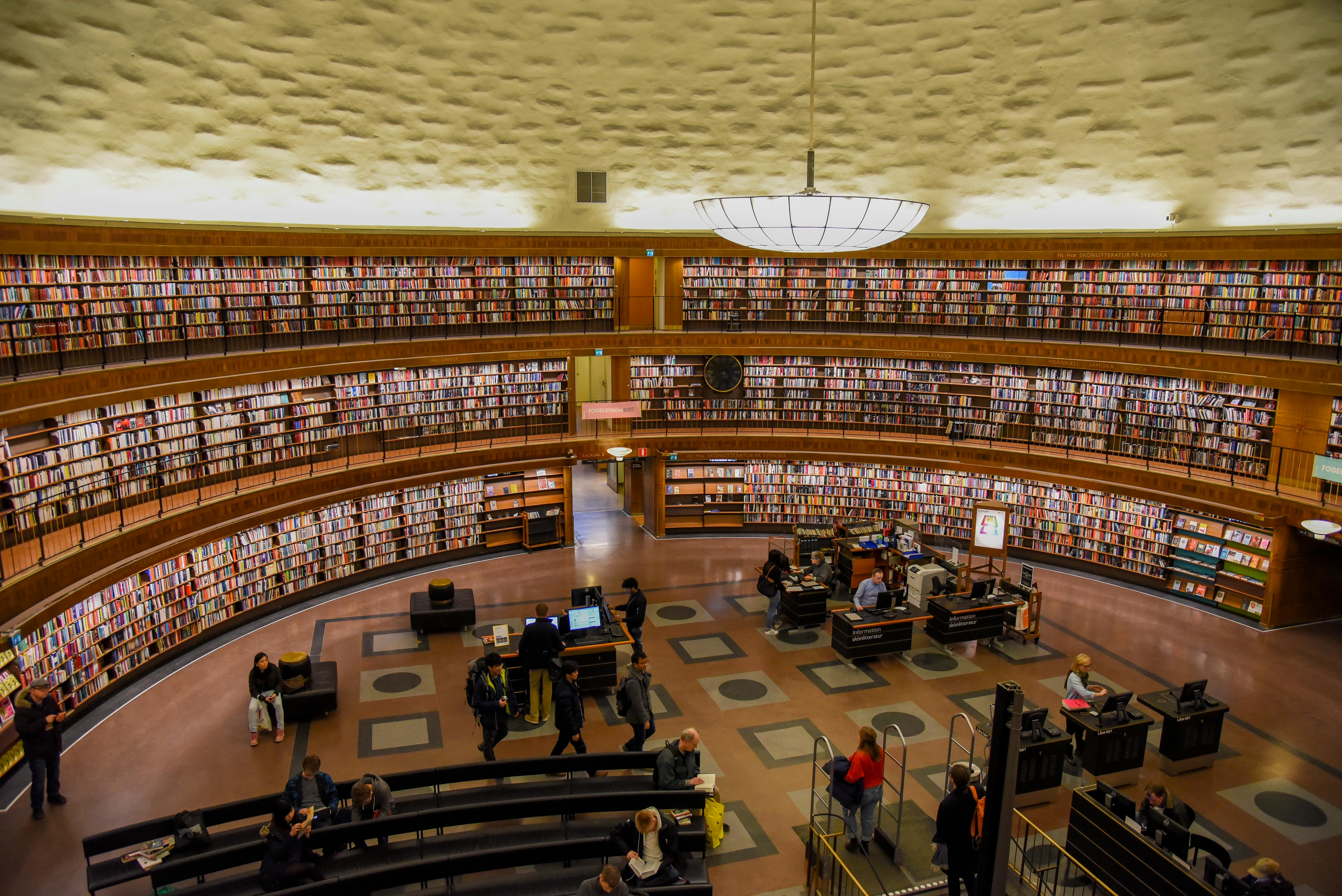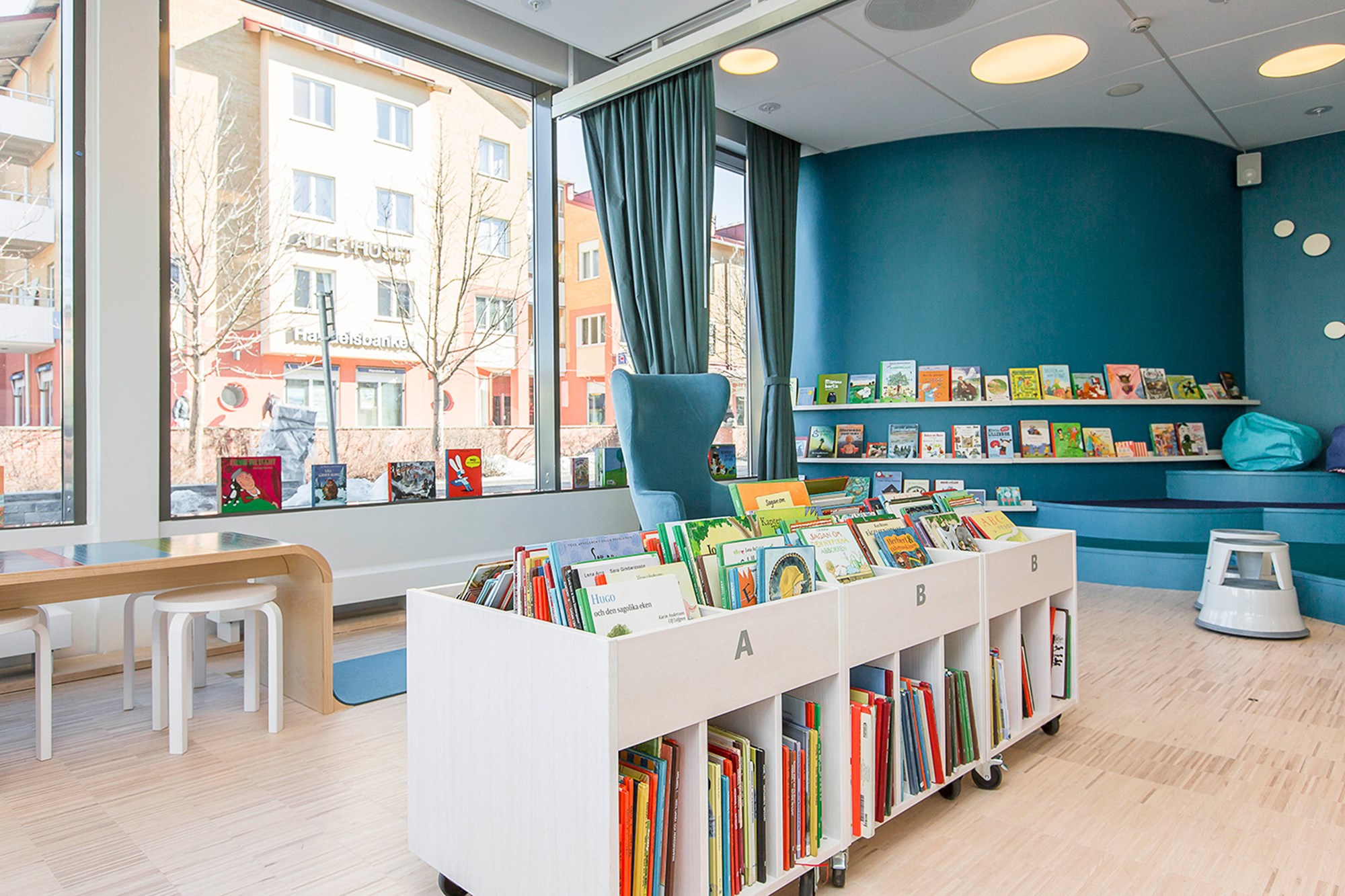 Photo © Mauro López / Lammhults Biblioteksdesign AB
Photo © Mauro López / Lammhults Biblioteksdesign AB
 Photo © Mauro López / Lammhults Biblioteksdesign AB
Photo © Mauro López / Lammhults Biblioteksdesign AB
Libraries have long been the cornerstones of society, providing access to books, knowledge, and learning resources. Over the years, their role has expanded beyond just offering literature. Today, libraries have evolved in many countries into vital community hubs, uniting individuals from diverse backgrounds and bridging gaps in language, culture, and socioeconomic status.
As societies become more interconnected, libraries play a crucial role in promoting inclusion, equality, and mutual understanding. They support education, digital literacy, cultural exchange, and community engagement, making them essential in fostering stronger, more cohesive communities. This is why libraries should also be recognized more for their potential to support the green transition.
Libraries struggling to survive
However, despite their valuable contributions, there is a growing trend of closing libraries, driven by financial, technological, and societal factors. One key reason for this trend is the decline in physical visits, which often coincides with shrinking government budgets. Many local governments, facing financial constraints, view libraries as non-essential and cut funding or close facilities altogether. Additionally, the rise of digital platforms for entertainment, information, and social interaction has contributed to declining interest in traditional library services. This failure to adapt to digital trends has contributed to declining interest, with fewer people visiting libraries for conventional services.
This is also relevant in Bosnia and Herzegovina (BiH). The most important library in the country, the National and University Library of Bosnia and Herzegovina, has been fighting for survival for years—poor financial conditions is one of the reasons.
The first public library in BiH was opened several centuries ago - in 1630. A systematic and organized network of public libraries only began to take shape in the 1960s after the enactment of the Law on Library Activities back in 1957. Five years ago, the National and University Library of Bosnia and Herzegovina launched the Guide to Public Libraries in Bosnia and Herzegovina, a publication to highlight the vital role of libraries in the country’s cultural, educational, and scientific development. This was an important activity, but the discussions on closing the libraries are still ongoing.
While many countries are scaling back on library investments, Sweden stands out for its continued commitment to these institutions, recognizing them as crucial community spaces. Rather than reducing support, Sweden continues to develop its libraries as centers for social unity and equality. The following sections explore Sweden’s steadfast support for libraries and the valuable lessons it offers to other countries facing challenges in preserving these important institutions.

Sweden’s public library model
Sweden has a long and deep tradition of libraries that dates back to the late 15th century when book and literature collections first began to emerge. Today, Sweden is home to 1,070 public libraries, reflecting the significant role these institutions play in Swedish society. Libraries have been central in fostering democratic values and contributing to Sweden’s strong educational and cultural reputation.
Modern Swedish libraries have evolved beyond their traditional role as book-lending institutions. In response to technological advancements and changing societal needs, they have transformed into cultural centers known as Kulturhus. These dynamic spaces provide quiet areas for personal reflection, study rooms for students, workspaces for professionals, and gathering places for community interaction.
Public libraries in Sweden are free and accessible to all, offering resources tailored to diverse communities, including marginalised groups. They provide multilingual books, language courses, and cultural events to promote inclusion. Rum för Barn (Room for Children) at Stockholm’s Kulturhuset is an excellent example of this commitment, offering music lessons, storytime sessions, games, and performances that inspire creativity and learning from a young age. Additionally, Swedish libraries emphasize lifelong learning and digital literacy, helping individuals with technological skills through workshops and access to digital resources. These efforts have made Swedish libraries key contributors to social cohesion, cultural exchange, and community development.
Public libraries in Sweden: vibrant community hubs
Swedish libraries offer more than just books and cultural events - they serve as vibrant community hubs where people of all ages connect, learn, and share experiences. They host diverse programmes and activities, encouraging meaningful engagement within communities. Book lovers participate in reading circles, where they discuss literature over coffee, while children join book clubs filled with fun and interactive activities.

Beyond reading, Swedish libraries offer an array of activities that help people connect and develop new skills. Knitting and sewing clubs provide a creative space for individuals to bond over shared interests, while also learning something new. Swedish libraries also recognize the importance of digital literacy, offering courses in IT and mobile phone tutorials to help individuals, especially seniors, keep up with the digital world. Language cafés are particularly popular among expats, offering a relaxed environment to practice Swedish over a traditional Swedish fika. Additionally, libraries serve as spaces for legal guidance, informal discussions, and workshops on diverse topics, reinforcing their role as inclusive and supportive community centers.
Children’s needs are a priority in Swedish libraries, reflecting the country’s strong commitment to young learners. Libraries host painting workshops, role-playing sessions, exhibitions, and homework support, fostering creativity, socialization, and critical thinking.
Swedish libraries promote inclusivity and strengthen social cohesion through these initiatives, creating accessible and engaging spaces for all.
A call to action: investing in libraries for stronger communities
Sweden’s approach to public libraries is an inspiring example for countries seeking to build more cohesive societies. Libraries are not just places for books; they are vital spaces where people from all walks of life can come together, learn, and grow. However, this transformative role requires sustained investment and a strong political and social commitment. Governments should recognize libraries as essential community hubs and allocate the necessary resources to support them.
Countries with struggling library systems can draw inspiration from Sweden’s inclusive, community-focused model and adapt it to their unique contexts. In Bosnia and Herzegovina, the National and University Library has already implemented this approach by expanding its role beyond books—organizing and co-hosting scientific meetings, professional training, literary evenings, exhibitions, and more. However, as emphasized in the Guide to Public Libraries in Bosnia and Herzegovina, many communities across the country still lack functional libraries, revealing a significant gap in access to cultural and educational resources. This underlines the clear need for renewed commitment and structural support.
Investing in libraries is an investment in the future. These institutions provide access to knowledge, skills, and opportunities that empower individuals and strengthen communities. By prioritizing libraries, governments can break down barriers, promote inclusivity, and foster meaningful social interactions. More than just cultural institutions, libraries are engines of social progress, contributing to long-term societal development.
Sweden’s library system demonstrates that soft investments - those directed toward societal needs - are among the most effective strategies for fostering social cohesion. As the world navigates rapid technological and social changes, it is time for other countries to follow Sweden’s lead and champion libraries as essential pillars of a thriving, connected society.
References:
Stockholm’s city library – Events and activities
The evolution of libraries to the 21st century
Libraries Are in Decline: Let’s Renew Them
Public libraries as promoters of social sustainability?
A guide to public libraries in Bosnia and Herzegovina
NUBBiH: Promotion of the publication Guide through Public Libraries of Bosnia and Herzegovina
Discover the News and Updates section, delivering the latest updates and insightful content across various topics. Stay informed with most recent news articles, reports, and publications, of the BiH SuTra project.